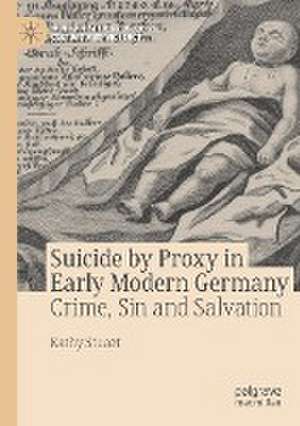Suicide by Proxy in Early Modern Germany: Crime, Sin and Salvation: World Histories of Crime, Culture and Violence
Autor Kathy Stuarten Limba Engleză Paperback – 2 feb 2024
| Toate formatele și edițiile | Preț | Express |
|---|---|---|
| Paperback (1) | 311.41 lei 3-5 săpt. | |
| Springer International Publishing – 2 feb 2024 | 311.41 lei 3-5 săpt. | |
| Hardback (1) | 318.89 lei 3-5 săpt. | |
| Springer International Publishing – 25 iul 2023 | 318.89 lei 3-5 săpt. |
Din seria World Histories of Crime, Culture and Violence
- 9%
 Preț: 815.58 lei
Preț: 815.58 lei - 20%
 Preț: 754.14 lei
Preț: 754.14 lei -
 Preț: 383.12 lei
Preț: 383.12 lei - 15%
 Preț: 699.12 lei
Preț: 699.12 lei - 15%
 Preț: 700.29 lei
Preț: 700.29 lei -
 Preț: 449.90 lei
Preț: 449.90 lei - 8%
 Preț: 590.56 lei
Preț: 590.56 lei - 15%
 Preț: 695.85 lei
Preț: 695.85 lei - 15%
 Preț: 586.23 lei
Preț: 586.23 lei - 15%
 Preț: 583.13 lei
Preț: 583.13 lei - 18%
 Preț: 728.91 lei
Preț: 728.91 lei - 15%
 Preț: 589.84 lei
Preț: 589.84 lei - 18%
 Preț: 730.47 lei
Preț: 730.47 lei - 18%
 Preț: 725.26 lei
Preț: 725.26 lei - 18%
 Preț: 890.06 lei
Preț: 890.06 lei -
 Preț: 351.49 lei
Preț: 351.49 lei
Preț: 311.41 lei
Nou
Puncte Express: 467
Preț estimativ în valută:
59.59€ • 62.34$ • 49.50£
59.59€ • 62.34$ • 49.50£
Carte disponibilă
Livrare economică 12-26 martie
Preluare comenzi: 021 569.72.76
Specificații
ISBN-13: 9783031252464
ISBN-10: 3031252462
Ilustrații: XX, 466 p. 48 illus.
Dimensiuni: 148 x 210 mm
Greutate: 0.58 kg
Ediția:1st ed. 2023
Editura: Springer International Publishing
Colecția Palgrave Macmillan
Seria World Histories of Crime, Culture and Violence
Locul publicării:Cham, Switzerland
ISBN-10: 3031252462
Ilustrații: XX, 466 p. 48 illus.
Dimensiuni: 148 x 210 mm
Greutate: 0.58 kg
Ediția:1st ed. 2023
Editura: Springer International Publishing
Colecția Palgrave Macmillan
Seria World Histories of Crime, Culture and Violence
Locul publicării:Cham, Switzerland
Cuprins
1. Introduction.- 2. Liturgies of Suicide by Proxy.- 3. “Fear God and the Court, while there is still Time.” Crime and Zealous Prosecution in Early Modern Hamburg.- 4. “The Unbelievably Frequent Examples of such Murders Committed solely out of Weariness with Life.” Hamburg, 1668-1810.- 5. Mary with the Axe. The Cult of the Injured Icon in Baroque Vienna.- 6. The Injured Crucifix: The Emperor’s Conscience and Prisoners’ Defiance.- 7. Crime and Justice in a Sacred Landscape. Vienna, 1668-1786.- 8. Conclusion: The Decline of Suicide by Proxy and its Historical Effacement.
Recenzii
“Kathy Stuart has written an excellent study of suicide by proxy, a term she uses to refer to people who committed crimes, usually the killing of young children, with the intention of being executed. ... Stuart’s most important contribution is her linking suicides by proxy to social discipline, which, historians agree, greatly increased among both Protestants and Catholics during the Reformation era. ... Stuart has ... produced an excellent piece of scholarship.” (Jeffrey R. Watt, Austrian History Yearbook, March 11, 2024)
Notă biografică
Kathy Stuart is Associate Professor of History at the University of California, Davis, USA.
Textul de pe ultima copertă
"With this excellent study, research on suicide by proxy is taken a step further to constitute a field of research on its own. The cross-confessional approach between Lutheran Hamburg and Catholic Vienna, enables the author to show that this largely forgotten historical phenomenon was a fluid and malleable practice adopted by perpetrators according to their local cultural and confessional context."
--Jonas Liliequist, Umeå University, Sweden
Suicide by Proxy became a major societal problem after 1650. Suicidal people committed capital crimes with the explicit goal of “earning” their executions, as a short-cut to their salvation. Desiring to die repentantly at the hands of divinely-instituted government, perpetrators hoped to escape eternal damnation that befell direct suicides. Kathy Stuart shows how this crime emerged as an unintended consequence of aggressive social disciplining campaigns by confessional states. Paradoxically, suicide by proxy exposed the limits of early modern state power, as governments struggled unsuccessfully to suppress the tactic. Some perpetrators committed arson or blasphemy, or confessed to long-past crimes, usually infanticide, or bestiality. Most frequently, however, they murdered young children, believing that their innocent victims would also enter paradise. The crime had cross-confessional appeal, as illustrated in case studies of Lutheran Hamburg and Catholic Vienna.
--Jonas Liliequist, Umeå University, Sweden
Suicide by Proxy became a major societal problem after 1650. Suicidal people committed capital crimes with the explicit goal of “earning” their executions, as a short-cut to their salvation. Desiring to die repentantly at the hands of divinely-instituted government, perpetrators hoped to escape eternal damnation that befell direct suicides. Kathy Stuart shows how this crime emerged as an unintended consequence of aggressive social disciplining campaigns by confessional states. Paradoxically, suicide by proxy exposed the limits of early modern state power, as governments struggled unsuccessfully to suppress the tactic. Some perpetrators committed arson or blasphemy, or confessed to long-past crimes, usually infanticide, or bestiality. Most frequently, however, they murdered young children, believing that their innocent victims would also enter paradise. The crime had cross-confessional appeal, as illustrated in case studies of Lutheran Hamburg and Catholic Vienna.
Kathy Stuart is Associate Professor of History at the University of California, Davis, USA.
Caracteristici
Offers an original contribution in the field of early modern history of crime, violence and religion Emphasizes the porous boundaries of the early modern self Investigates the local religious contexts and disciplining techniques that shaped the suicidal choices of people
